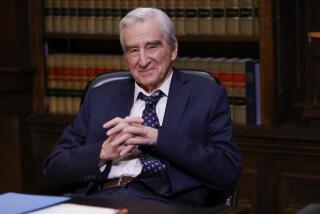Leslie Stevens; Prolific TV, Movie Creator
Leslie Stevens, a prolific writer, director and producer whose successes spanned more than four decades, from the Broadway play “Marriage-Go-Round” to such television series as “McCloud” and the reprised “Outer Limits,” has died. He was 74.
Stevens died Friday at UCLA Medical Center from complications of a blood clot on the heart, his wife, Shakti Chen Stevens, announced Monday.
His output was immense, and he created successful productions on stage, film and television with equal ease.
“I’m a laborer,” Stevens told an interviewer years ago, showing a callused finger. “I write in longhand. I’m a working-class dramatist. I write every day, about half a day, and every 15 to 40 days there’s another script.”
Stevens’ “Marriage-Go-Round” in the 1950s starred Charles Boyer and Claudette Colbert, and he later adapted the play into a successful 1960 motion picture starring James Mason and Susan Hayward. Stevens’ most recent film, “Gordy,” which he wrote and produced in 1994, was praised by a Times reviewer as a fine family movie.
Along the way, Stevens wrote such films as “The Left-Handed Gun” starring Paul Newman in 1958, “Heroes Island” starring James Mason in 1962, “Buck Rogers in the 25th Century” in 1979, “Sheena” in 1984 and “Return to the Blue Lagoon” in 1991.
Stevens never tired of writing plays and screenplays, but he is probably best known for his small-screen output--more than 1,000 hours of prime-time programming.
He wrote and produced “McCloud” starring Dennis Weaver from 1970 to 1977, “Name of the Game” starring Gene Barry and Tony Franciosa from 1968 to 1971 and “It Takes a Thief” starring Robert Wagner from 1968 to 1970. He helped create, write, direct and produce “The Outer Limits” from 1963 to 1965 and was program consultant on its 1990s version, now airing on cable.
Stevens had a hand in writing and producing myriad television movies, among them “Search,” in 1972, and its subsequent series; “The Gemini Man,” in 1976, and its series; “Stonestreet: Who Killed the Centerfold Model?” in 1977; “The Vanishing Son” series in 1994; and “Tarzan’s Return” in 1996.
In 1980, Stevens joined with Los Angeles Rams football team owner Georgia Frontiere to form Empress Productions, producing plays for the John F. Kennedy Center for the Performing Arts in Stevens’ native Washington, D.C.
In 1991, he established the Leslie Stevens Fellowships for Television Writing to encourage new talent and to thank an industry that he said had been good to him. He also worked for many years with the American Film Institute as a teacher and mentor of young writers, and created the company Rosebud Moving Image Artists to assist young filmmakers.
Monday, his wife said Stevens tried to inspire “each and every person to do the one thing he loved best--to create. Leslie Stevens was a creator.”
The son of a Navy man, he grew up in the nation’s capital and caught the drama bug when he won a high school playwriting contest, earning a ticket to Orson Welles’ fabled Mercury Theatre. Enchanted, he kept hanging around until Welles mistook him for a gofer, sent him on coffee runs and let him work as a prompter. He sold his first play--”The Mechanical Rat”--to Welles for that theater when he was 15.
Stevens went to George Washington University, served in the Army, where he wrote and directed 30 shows for servicemen, and attended Yale Drama School and the American Theatre Wing.
In addition to his wife, Stevens is survived by a son, Steven, three daughters, Dana, Samantha and Sunday, and two grandchildren.
Services are scheduled for 11 a.m. Saturday at Westwood Village Memorial Park, 1218 Glendon Ave., Westwood.
More to Read
The complete guide to home viewing
Get Screen Gab for everything about the TV shows and streaming movies everyone’s talking about.
You may occasionally receive promotional content from the Los Angeles Times.






